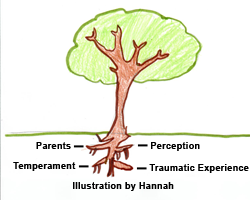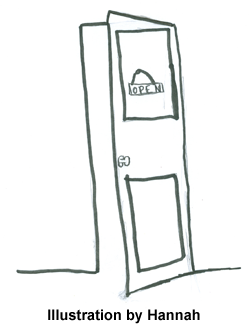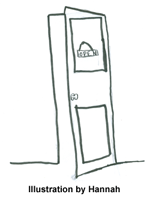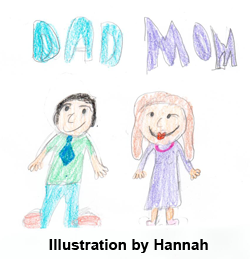 I am continuing our study on Emotions to discover how and when a negative response to life’s circumstances might have taken root in our life. In order to find the root, we must look at our past influences and experiences from birth to adulthood to see how and when the door was opened for a negative emotional response to begin.
I am continuing our study on Emotions to discover how and when a negative response to life’s circumstances might have taken root in our life. In order to find the root, we must look at our past influences and experiences from birth to adulthood to see how and when the door was opened for a negative emotional response to begin.
Last week, I listed 4 influences that weigh heavily on our responses to life’s circumstances. Take a look at Hannah’s illustration for a view of those 4 influences.
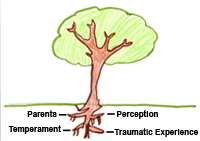
Today, we are going to concentrate on our PARENTS, which most educators believe affects us the most. In fact, psychologists have discovered that 85% of our behavior, attitudes, and emotional responses are established by the age of 5-6 by watching our parents.
One of the most fascinating studies I have ever done in regards to parents was from the book, You and Your Parents by Robert McGhee. It helped me to put pieces of the puzzle together for my life, starting in childhood, as well as being a big asset as I taught adult class on The Grieving Process.
The following is an excerpt from that book.
Types of Parents
McGee says that parents can be classified into 5 general types.
- Supportive, Accepting Parents
These are the parents who show love by affirming and disciplining in a loving way. - Emotionally Distant, Inactive Parents
A child may grow up having all his physical needs met, but misses out on hugs, affirmation, and intimacy. The parents are home, but not at home emotionally. - Abusive Parent
Abuse comes in the form of physical, sexual, or verbal. - The Absent-Father Syndrome
A father may be absent from home due to death, divorce, work, or a pro-longed illness. This father doesn’t provide his children with the time and emotional support they need. - Perfectionistic Parents
These parents set high and rigid standards that their children cannot reach.
Blocked Development
From these types of parental modeling, McKee says that a child’s emotional, relational, and his view of God MAY BE BLOCKED in one of the four stages of development.
1. Bonding: The Need to be Loved. (Birth-2 years old)
Its’ purpose is to convey feelings of warmth, love, value, worth, closeness, and trust. Some of the symptoms of being blocked in the bonding stage might include: shame, depression, emptiness, fear of closeness, addicted to drugs, alcohol, success, food.
A lady in one of my grieving classes described years of rejection from her mother. There were no hugs, no “I love you.” Just Mom going through the mechanical process of providing the physical needs for her daughter. At 15, Carrie got pregnant, and Mom insisted on an abortion. Lying on the operating table, Carrie ached once again for Mom to hug and comfort her, but none came. Years passed with Carrie desperately trying to please her mother and win her love. She also came to believe that God didn’t love her; particularly after what she had done. At 28, Carrie was blocked in the bonding stage emotionally, relational, and spiritually.
2. Separateness: The Need to Set Personal Boundaries. (2-11 years old)
In this stage, parents sometimes are unable to find a balance between advising and giving freedom to their child to begin forming his own thoughts and beliefs. Symptoms of blocked separateness includes: feeling responsible for making others happy, assuming others’ thoughts, feelings and behavior instead of developing one’s own, being unable to say no without feeling guilty, saying yes to please others.
Joy, another lady in my grieving class, shared her journey through bonding and separateness. Joy never doubted for a moment how much her parents loved her as a child. They showered her with hugs, provided her every need, and disciplined her with love and kindness. She also sensed just how much that Jesus loved her. So, what could be the problem?
Out of their love for her, Joy’s parents kept her under their wing to protect her. In short, they smothered her. Joy became a cripple at making decisions on her own and lost confidence in herself. She lost sight of how she felt, what she desired, and was too intimidated to pursue her own thoughts and beliefs. She became a puppet on a string in her adult life trying to please everyone with whom she interacted. She also didn’t feel she could trust herself to make a decision God was calling her to make.
3. Adolescence: The Need to Develop Adult Behavior and Identity. (12-18 years)
Symptoms of blocked Adolescence might include: a poor self-concept, uncertainty about one’s personal strengths and weakness, bitterness, making unwise choices, unwilling to take risks, taking impulsive risks, unwilling to accept responsibility and consequences.
4. Maturity: The Need to Continue Growing in Adult Behavior and Identity. (19 & older)
Symptoms of blocked Maturity might include: anxiety about the future resulting in sleeplessness, chest pains, muscular tension, increasing depression, inability to concentrate, being hurt and becoming preoccupied with revenge or “getting even.”
My former pastor, the late David Berkheimer, tells the story of a young couple who had just gotten married and the husband was watching his young bride cook their first Sunday meal of pot roast. Before she put the roast in the pan, she cut off the tip end of it. “Why are you cutting off the tip end of the roast,” the astonished young husband asked. “Because Mama does and you are supposed to do it that way,” she replied.
Not satisfied with her answer, he called his mother-in-law and asked her, “Why do you have to cut the tip end off the roast before cooking it?” His mother-in-law replied, “I cut it off because my mother did it that way. I’ll ask my mother that question.” Upon asking the grandmother the question that had so intrigued this new member of the family, grandma replied: “You don’t have to cut the tip end of the roast off before cooking it. I cut it off because my pan was too small.”
I conclude that sometimes examples of behavior and attitudes our parents modeled before us are good and should be passed down; sometimes they are not, and it goes much deeper than whether to cut the end off a pot roast or not.
Exodus 20:5 says: “I am a jealous God visiting the sins of the fathers upon the children to the third and fourth generation that hate me.”
The key word in this scripture is visiting. The King James’ version of the Bible translates visiting as bringing down.
Ask yourself the question, “Do you see a re-occurrence in your family for the last couple of generations of such things as bitterness, sexual misconduct, incest, racism, alcoholism, gambling, manipulation, negative attitudes, thought patterns, etc.?”
May I say to you that those things are paying a visit to each generation because no one has closed the door on them when they came knocking?
The good news is this: You can be an instrument in charting a new course of direction for your children and grandchildren where there have been negative influences from the previous generation. When we realize what God did for us on the cross, no past family situation can out influence the influence of our heavenly father.
May I leave you with one final thought.
It is God’s design that parents model before their children the express image of Jesus. However, back to the days of Adam and Eve, all that changed as sin entered the world. Parents are imperfect beings and for various reasons sometimes can’t or won’t be the way God intended them to be.
For example:
- Some have financial or health problems that consume their minds.
- Others have unresolved hurts from their own past and transfer these hurts to their children.
- Some of them are modeling the example their parents set before them, and don’t know any difference.
- Most parents are doing the best they know how to do at the time!
Join Hannah and me next week as we take a look at another root cause of your negative emotional response: Temperament.









